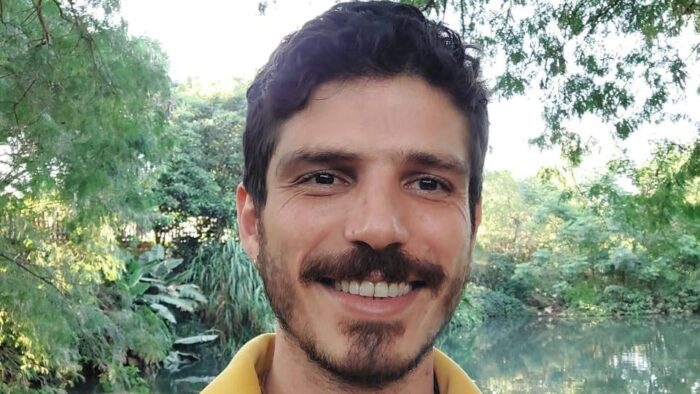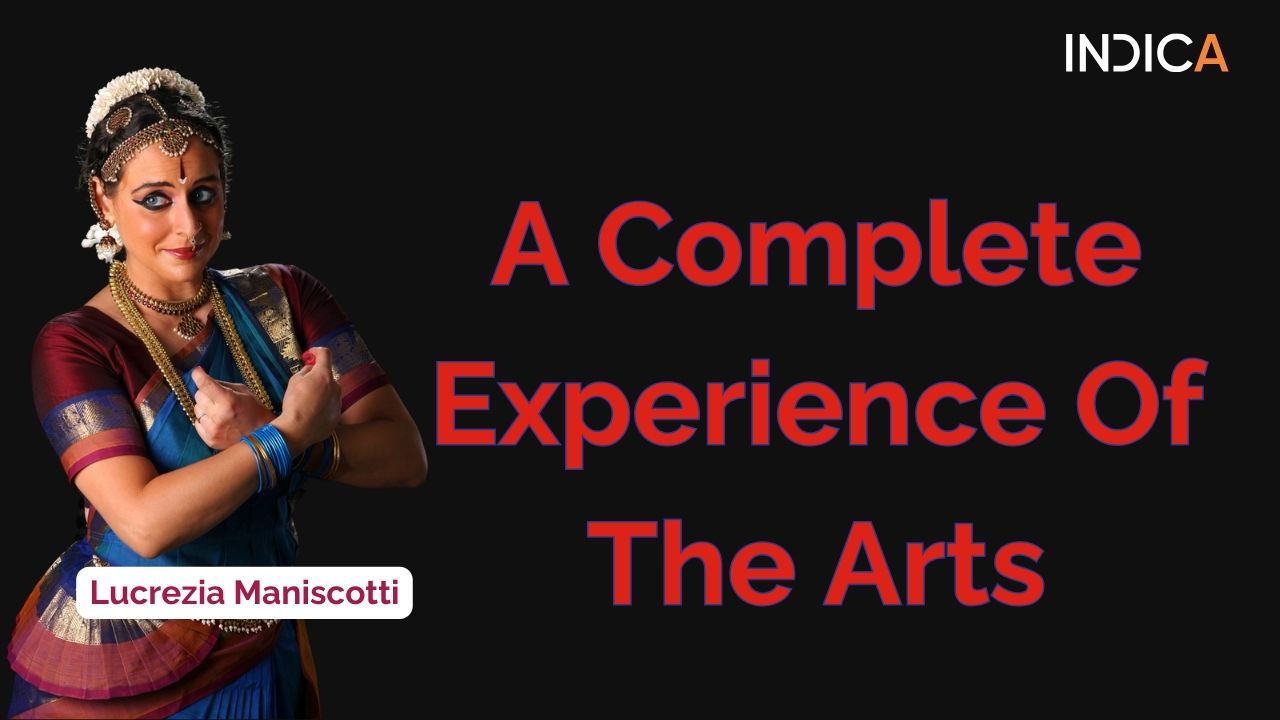Amratananda Das (Alex) practices Sanatana Dharma in Brazil and is a student as well as a teacher of Ayurveda, Yoga, Jyotisha, and Samskritam. In this interview he speaks to CSP about the need for Hinduism in Brazil but also the challenges for true seekers.
You said in a recent talk that Yoga helped ground you in your teenage years and also you gave up eating meat subsequently. Do you think these two areas are often the most understated benefits of Yoga?
Yes. Yoga changed Western society and its mindset in many subtle ways, and people do not always acknowledge this. In fact, I believe vegetarianism here is a direct influence of Hindu spirituality and philosophies as yoga and Vaishnavism (as the Hare Krsna movement introduced a lot of Indic vegetarian dishes in the west by way of prasad distribution and restaurants). Vegetarianism was almost an alien word in my childhood and nowadays it is becoming more common and is a direct influence of Yoga for sure.
Brazil shares a similar history of colonization as India. Do you think that Indian systems of Yoga and Ayurveda are facilitating a sense of pride in Brazil's own indigenous practices?
Yes. Ayurveda in Brazil gave legitimacy for the Native traditions of Brazil to be also viewed with a more scientific approach. You can find a growing number of youth here that practice Shamanic religions and lifestyles (we call it Pajelança).
Soft Power is good but ancient systems sometimes suffer when transposed to other countries. How have Yoga and Tantra suffered in Brazil due to pressure to be exotic and sensual. Societies that are very materialistic may benefit the most from Yoga, but are they also ones that are following the West in trashing authentic practice?
Indeed. Some yoga teachers and schools in the West follow a materialistic understanding of Yoga with a new age mask for it, bringing many distortions to the practice. De Rose is one famous yoga school that was founded by a Brazilian by the same name. His books claim his yoga is the authentic yoga - a classical yoga which came from Shiva. But his history is based on colonialist theories like the Aryan invasion theory and something about chakras and mantras.
He became a millionaire and his organisation has branches in Europe. His form of Yoga is elitist, commercialised, sensual-ized and competitive, where you have to build the perfect body and exhibit perfect poses, with no belief in God, involving worship of him as a guru. He fought legal cases and has lost the right to use the name Yoga as he was declared an atheist. He holds many Hinduphobic views popular in mainstream media, promotes colonial history and has a distorted knowledge of shastras and samksar.
Sometimes in Brazil, there is also a distortion of the message of Tantra, where Tantra is sold as erotic massages claiming to be a Tantric therapy to free the mind of dogmas. There are many New Age Yoga groups which tend to support a Marxist narrative, always siding with Islamic and Christian perspectives against native Indic Hindu perspectives. In their anxiety to prove all religions are the same they mix Vedanta with Abrahamic texts. The problem is that they side with the colonial narrative in India against Hindu revival, surely a direct influence of the mainstream media and education system that is designed to support Western perspectives.
Brazil has a huge migrant population. Isn't it incredible that in the midst of it all Hinduism has found some space? What are the commonalities with the African immigrants worship practices and those of Hindus?
Brazil is a really miscegenated society, which makes our civilization more pluralistic, and open to the more universal approaches of Hindu Dharma. African religions here survived mostly by hiding and creating syncretism. They started to associate their Gods (Orixás) with the Catholic saints. Umbanda is a mix of Catholic, African and Shamanic traditions, but survived mostly by using Catholic saints name for their Gods. Candomblé is more African rooted with less syncretism, associated more with native Shamanism than with Catholicism. African religions worship icons of Gods and make offerings of food, but also have animal sacrifice and wine.
Their practices are similar with Hindus in some aspects, as they have many Gods, they are close to nature, they worship nature also like Hindus, and their celebrations involve dance, music, food and are colorful. Some of their practices are different from those of Hindus, although I have heard of incorporation rituals is some sects in Tamil Nadu. They incorporate spirits of the Orixás (Gods of nature) and also of other spirits like the Preto Velho (spirits of ancient, wise, enslaved old men and women who had power to cure illnesses); Pomba Gira (spirits of a sexual nature, when men dress and act as women) and even the People of East (similar to gypsies but they say are they are from India and give blessings and predict the future).
There are many gypsy communities in Brazil who came in during the colonial period. They were all forced to convert on arrival and today are mostly Christians, but they have retained many beliefs and culture like language (similar to Punjabi and Sindhi), dance, music, fire, rituals, same caste marriages, palm reading, etc. Soon it became part of Brazilian culture and you can find many Catholic women who observe African religious practices and those of the gypsies.
You mention a French missionary who created a kind of religious practice which combines Hindu ideas of Karma and reincarnation with Christianity? Raised as a Catholic yourself, what attracts people to the whole value system of Sanatana Dharma rather than a piece meal approach?
We call it Espiritismo, a religion created by Allan Kardeck’s work - The Book of Spirits. He is not remembered in France, but is quite popular here. He has taken some ideas from the Vedas like Karma and reincarnation, and also communicating with higher spirits. But he preaches the Bible and focuses on Jesus as the main spiritual personality. The people of Brazil are naive and simple and even believe if someone uses Vedic ideas and credits it to the another religion. Unfortunately, I have noted people prefer a sugary approach to spirituality, and are not really interested in the truth. In search for some comfort in their lives of misery, some of these practices work as a placebo, atleast for most people. I studied with them when I was around 12 to 13 years old, but I quit when I realised they were superficial and I wanted to go deeper.
Yoga changed Western society and its mindset in many subtle ways, and people do not always acknowledge this. In fact, I believe vegetarianism here is a direct influence of Hindu spirituality: Amratananda Das
You bring Brazilians to India. What does a tour include?
Before the pandemic, I was bringing different tour groups to India. Usually had two kinds of tours, one more of a spiritual and touristic one of North India (covering Delhi, Haridwar, Rishikesh, Amritsar, Jaislamer Jodhpur, Pushkar, Jaipur, Agra, Varanasi, Vrindavan). We have visited many different temples and historical places to present people a compete tour of the vast perspectives of Indian ethos and heritage. The second kind of tour is an Ayurveda retreat in Kerala which ends in Rishikesh with Yoga classes. I plan to make more tours of different routes as soon as possible after the pandemic ends.
You mention similarities between indigenous populations and the people of North East India. What are they?
That’s a complex question, as Brazil has many different ethnic and linguistic native tribes, similar to North-East India. You can find some similarities between them in the skin colour, the features of the face and hair and also the tribal life style including the practise of using bird feathers to make head covers. This is based on impressions and speculations, but it is known that Native American people have ancestry in Asia, so it may not be far-fetched.
We know that the Kalingas, Cholas, Cheras and even the people of Saurashtra and Sindh used to navigate oceans in ancient times, creating an exchange of people and ideas between Europe, Africa, Arabia to West and South East Asia, Pacific islands and America to the East. Historians claim some migrants came by foot through Bering Strait between Siberia and Alaska.
Is there a demand for Indic courses in Brazil? Why is there only university offering a course related to India?
There is some demand for Indic courses, especially Ayurveda which is popular even to academic researchers and officials of the Government health system. In academics, there are few specialization of Indic studies. I know the USP University of São Paulo has Post Graduation courses in History of India and also Sanskrit. PUC, a private Catholic University has some chairs and lecturers about but it is usually colonial ‘bashing’ of the caste system and cow worship and glorification of the Mughals, sometimes even denying colonial atrocities and blaming of natives for all medieval problems. Usually, those who understand India better study under the guidance of some guru or cultural religious institutions, as universities are not the best place for pursuing such knowledge.
How can India help in making better translations available for people wanting to know more.
There are very few or no translations of most of Vedic Hindu literature in Portuguese. You can find the Bhagavad Gita, the Bhagavata Purana, some Upanishads, some short translations of Mahabharata, Yoga Sutras, Parashara Hora Shastra. These are the few that I know have Portuguese translations. One can’t guarantee all translations are trustworthy. Many are distortions and that's what makes it hard to spread Hindu ideas here as most of translations are filtered under a Western mindset. Indeed, more books of other Vedic literature need be available but the big challenge is that our editorial market is weak. Brazilians don’t read much and most books don’t sell enough to become profitable. Brazil is indeed in need of more Indic influence. The ICCR is welcome and I could help for sure.





